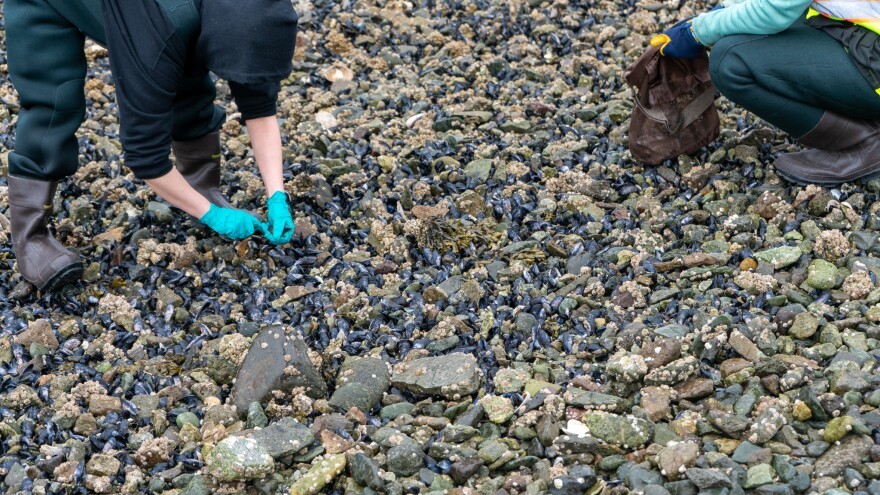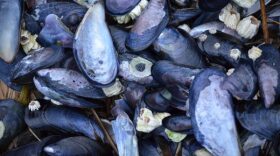In the summer of 2020, a person in Unalaska collected mussels and snails on a local beach and ate them. Hours later, they died from Paralytic Shellfish Poisoning or PSP. The shellfish contained extremely high toxin levels, causing symptoms of numbness, weakness and pain. The person ended up dying, despite being medevaced to a hospital in Anchorage.
To prevent tragedies like this, the Knik Tribe in South Central Alaska has been running a PSP monitoring program for nearly two decades. The program employs technicians in Unalaska and other communities across Alaska, like Sand Point, King Cove and Chignik Lagoon. These technicians collect regular samples of blue mussels, butter clams and other marine organisms.
However, the project was placed on “pause” in April as the federal government investigates its “legitimacy” in order to continue funding.
The program was funded by the Bureau of Indian Affairs through the Tribal Climate Resilience Solicitation. In an email to KUCB, officials with the Office of Public Affairs - Indian Affairs said that under President Donald Trump’s leadership, the U.S. Department of Interior is working to cut “bureaucratic waste and ensure taxpayer dollars are spent efficiently” and that “projects are being individually assessed by period of performance, criticality, and other criteria.”
Bruce Wright, chief scientist at the Knik Tribe, said he’s concerned about the suspension of one of the program’s projects, the “Paralytic Shellfish Poisoning Risk Management” project.
“Without us being out there and alerting people that there’s a risk or testing their subsistence harvest, we’re worried about them,” said Wright. “We hope the project starts up.”
Technicians test for dangerous neurotoxins produced by microscopic marine algae called Alexandrium. These naturally occurring toxins can move up the food chain, affecting various marine life, including salmon and crabs.
The monitoring program is particularly crucial for Unalaskans because the Aleutians regularly have higher PSP levels than the rest of the state, said Wright. He thinks the rise in PSP in recent years may be related to warming ocean waters.
“I don't think our ocean temperatures are going to go down, so we don't have a way to control the Alexandrium blooms,” said Wright. “That just means we have to figure out a way to adapt to these changes. And people are good at adapting, we can figure these things out.”
The tribe has issued warnings in multiple languages during high bloom periods to reach as many people as possible, especially at fish processing plants where folks might not already know about PSP in locally harvested foods.
“Hundreds of people have died in the state from PSP, and probably thousands have been sickened or had symptoms,” said Wright. “So, it's serious.”
When the project was active, people from around the state could send samples of their collected harvest for testing, freeze the rest and wait for safety notifications from the tribe. The U.S. Food and Drug Administration considers 80 micrograms per 100 grams the safety limit, but recorded levels in Alaska have exceeded 32,000 micrograms.
The timeline for the Knik Tribe to receive a funding decision remains uncertain, but there’s cautious optimism among Wright and the tribe’s environmental project coordinator. Recently, one of their other federal projects studying beluga whale diets resumed after a similar review process, giving them hope that the PSP monitoring program might also be reinstated.
Until further notice, the Knik Tribe advises harvesters not to eat anything that could have high levels of PSP like mussels, clams and scallops, and suggests freezing harvests till testing resumes. The tribe is also exploring state funding options.






